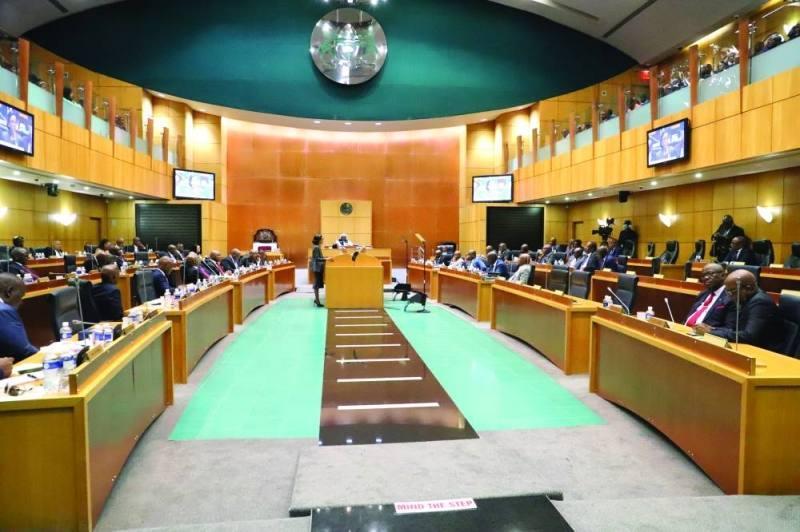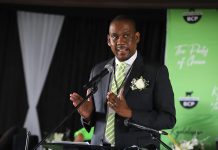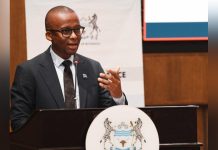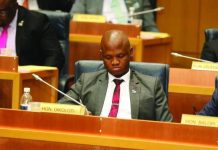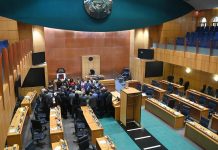Africa-Press – Botswana. Parliament wrapped up its business on Friday by adopting a motion calling on government to urgently prioritise resolving the country’s worsening health crisis.
The motion, brought as a definite matter of urgent public importance by Kgalagadi North MP, Mr Reason Lekutlane urged government to mobilise funds in all possible ways and forms to purchase essential medication, settle outstanding health bills and restore medical operations across public health facilities.
MP Lekutlane painted a grim picture of the country’s public healthcare system, citing severe shortages of medication, halted medical procedures and shortage of doctors. He highlighted critical shortages in essential supplies, including medical dressings and syringes, which had forced patients to purchase those items themselves.
“We must act before the medicine even reaches our people, ensure it is there and accessible,” he said, adding that there was also a growing public concern about the deteriorating state of public healthcare facilities, where reports of stock outs and delays have become increasingly common.
He said Princess Marina Hospital, the country’s main referral hospital, was overwhelmed with emergency units overcrowded and staff overburdened.
“Operations have stopped, there are not enough doctors, the situation is worrisome,” he said, adding that some patients were continuously rescheduled for operations while their conditions deteriorated.
MP Lekutlane also highlighted the dire situation in rural areas, where access to private healthcare was non-existent.
“People from Xere and Mokgenene know nothing about pharmacies in their villages,” he said, calling on government to act for those who relied solely on public health facilities.
Mr Lekutlane therefore proposed the reallocation of funds from special levies, including the alcohol levy, fuel levy, and road fund to address the crisis. He further suggested suspending non-essential government projects to redirect resources toward health.
The MP also urged the public and corporate sector to consider donating to a national health emergency fund, comparing the situation to the COVID-19 pandemic response, where special funding mechanisms were quickly mobilised to protect lives.
The Vice President and Gaborone Bonnington South MP, Mr Ndaba Gaolathe, acknowledged the seriousness of the health crisis but expressed concern about the motion’s framing, calling it flawed. He clarified that life-saving procedures had not been suspended, although systemic issues in the health sector persisted.
Mr Gaolathe, who is also the Minister of Finance, explained that special funds, such as those from levies, were already being utilised and that the government’s investment account had limited capacity. He emphasised that the health crisis reflected broader structural weaknesses in the national system, not just isolated shortages of medication.
“It is not only about medication shortages, every system is broken and needs fixing,” he said, citing international engagements, including talks with Japan, as part of the government’s efforts to secure external assistance.
Backing the motion, several MPs highlighted the eroding public confidence in the health system and the human cost of inaction. Dr Edwin Dikoloti, Good Hope/Mmathethe MP, lamented chronic understaffing, stating Botswana had only 0.3 physicians per 1 000 people, far below the WHO’s recommendation. In places like Seronga, he said, one doctor served over 3 700 people.
Maun East MP, Mr Goretetse Kekgonegile supported the motion, citing frequent delays in surgeries and the dire situation in remote regions like Chobe area. “We are sentencing people to death,” he warned, urging government to reprioritise spending to focus on healthcare.
Lobatse MP, Mr Kamal Jacobs said the situation required urgent international cooperation. “We cannot allow our people with chronic conditions like HIV, asthma, and high blood pressure to die,” he said, and issued a passionate appeal to fellow leaders, urging immediate action to address the ongoing shortage of medical supplies affecting citizens across the country.
Ngami MP, Mr Philemon Aaron made a bold call for leadership sacrifice, suggesting a 10 per cent salary cut for all political leaders and suspension of constituency allowances, especially for the President and Speaker of the National Assembly and specially elected MPs and nominated councillors, until the crisis was resolved.
“Let us start with financial sacrifices to help redirect resources toward the health sector. I proposed a 10 per cent salary cut for all senior government officials, beginning with those in the Head Office,” he said.
He said while MPs differed on funding strategies, he pointed out that the situation transcended political lines. Mr Aaron stressed that the right to health was the foundation of all other human rights. He therefore called on government to urgently restore confidence in the health system and deliver life-saving services.
Source: dailynews
For More News And Analysis About Botswana Follow Africa-Press

